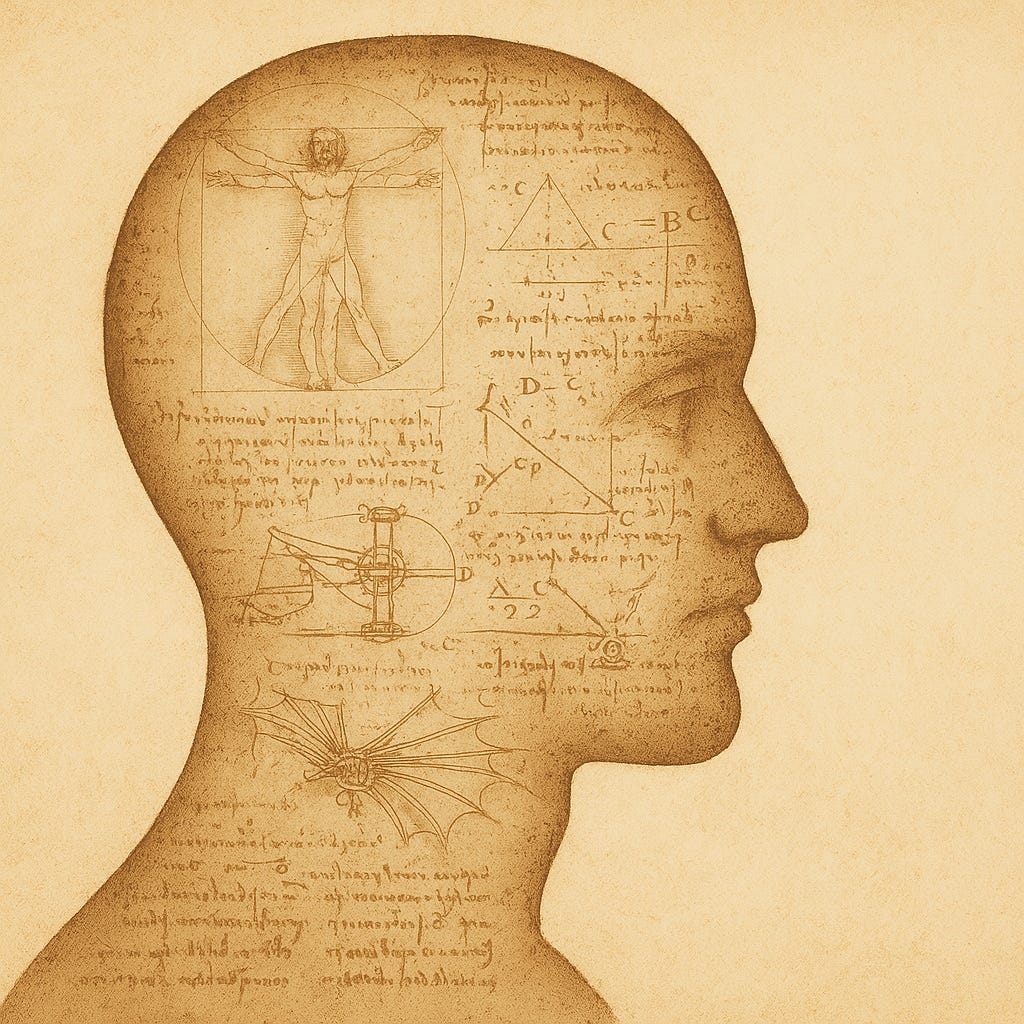Why Becoming a Generalist Is the Key to Success in the Modern World
Lessons from Leonardo and the Return of the Integrated Mind
There was a time when success was measured by how deep you could go in one thing. You picked a lane, got good at it, and stayed there.
But that era is fading.
Now, it’s about how well you can connect everything. How many languages you can speak, not just with your voice, but with your skills. How many dots you can see, and more importantly, how many you can link.
The world we live in is moving too fast for rigid minds. It demands flexibility.
Curiosity.
A willingness to start again and again, in new directions, with new questions.
Specialization still matters. But when it stands alone, it often leaves us brittle. A specialist knows what to do when everything goes according to plan. A generalist knows what to do when it doesn’t.
We need minds that move across boundaries. That adapt. That stretch wide before they go deep.
We need minds that aren’t afraid to ask, “What else is connected to this?”
Because the answer to that question is where the real breakthroughs happen.
And make no mistake, this is not a trend but an acquired skill needed to flourish.
It’s a revival of a deeper way of thinking. One that shaped the Renaissance and gave rise to people like Leonardo da Vinci, who didn’t just master one subject, but wove many together into a tapestry of artistic genius.
Da Vinci had a Mind That Moved
Leonardo painted the Mona Lisa, engineered bridges and war machines, dissected cadavers to study anatomy, and sketched out flying contraptions long before the Wright brothers.
He studied light and motion. He mapped rivers. He imagined cities.
He lived as if no field was off limits.
And what’s wild is none of it felt random to him. Because in his mind, everything was part of the same puzzle. Art, science, nature, architecture, philosophy, none of these were separate. They were just different faces of the same truth.
Da Vinci didn’t compartmentalize the world. He explored it as one unified whole.
Modern Proof of the Multidimensional Mind
We don’t need to look far to see how this mindset still pays off today.
The most interesting and impactful thinkers, the ones who bend industries and create new paradigms, are rarely locked into one field.
Nobel Prize winners are statistically more likely to have artistic hobbies. The overlap between play and precision matters more than we think.
Steve Jobs took a calligraphy class in college just because he was curious. Years later, that “useless” decision shaped the design philosophy of one of the most valuable companies on Earth.
Elon Musk didn’t become a rocket scientist by training. He built a mental toolbox from physics, coding, design, and economics and applied it in ways traditional experts never would.
What ties them together isn’t just intelligence but the range in which they allow their minds to play. And what fueled that range was curiosity.
The edge of any given knowledge paradigm lives in the in-between. In the messy intersections. In the uncharted overlap where new ideas emerge.
How to Think Like a Polymath Without Getting Lost
Curiosity is powerful. But if left unchecked, it can spin into distraction. That’s why generalism isn’t about chasing shiny objects, but about giving curiosity structure and flow.
It’s about holding complexity without drowning in it.
Here’s how I approach it:
Follow your obsessions. Track the things that light you up even if they don’t fit neatly together. Trust that meaning will emerge through movement and action.
Learn in seasons. Go deep for 2–3 months on one topic. Read. Study. Build. Then step back. Let it breathe and move to the next.
Connect the dots. Merge your learnings into something real. Don’t just consume but create. Let your ideas overlap and projects coexist.
Document the journey. Keep a journal and take it with you on all of your adventures. let the journal reflect your wandering thoughts where later you can build on them.
When practiced with intention, the polymath mindset doesn’t fragment you, it reveals YOU.
Generalists Aren’t Scattered
To be a generalist is to become more whole.
It’s not about doing more projects. It is about integrating your varying energies into a complete whole. You will become someone who can see across boundaries, who can recognize the hidden patterns, who can adapt when the path forward isn't linear.
Yes, it takes time. But time is the terrain of transformation. Mastery doesn’t arrive overnight: it builds in silence, through layering and return.
Being a generalist isn’t about being average at everything.
It’s about creating a sum that is greater than all of its parts
The Vitruvian Life Is the Library for That Journey
This is what The Vitruvian Life is about.
It’s not just a brand. It’s a framework. A space for integrated thought and embodied knowledge. For practices, stories, and tools that help you become less divided and more aligned.
We’re not here to live half-lives.
We’re here to become whole.
To stretch our minds beyond the edges. To blend ancient insight with modern motion. To build a life that honors both the depth and the range of what it means to be human.
The generalist isn’t the opposite of the specialist.
It’s the next evolution of one in a brave new world with unlimited leverage and tools to maximize your thought-to-creation ratio.
Start becoming.




